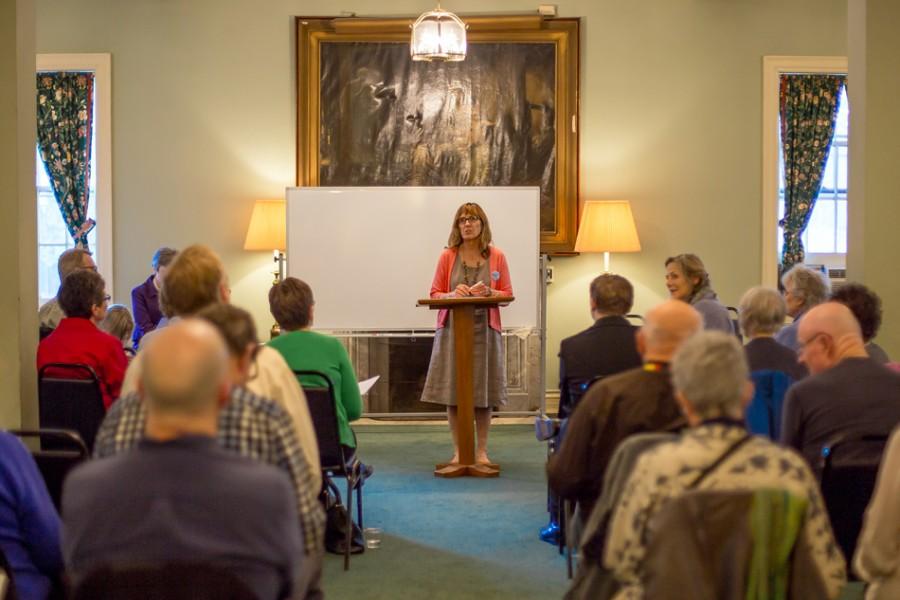Evanston’s affordable housing plan inadequate, community members say
Zack Laurence/The Daily Northwestern
Kathleen Nadler greets a full room Monday night at Evanston’s First Congregational Church. Nadler, the president of Interfaith Action of Evanston, joined in discussion with other community members on how to act on the city’s homelessness crisis.
May 12, 2015
Some Evanston community members say the city isn’t doing enough to help its homeless population.
Interfaith Action of Evanston, a religious advocacy group, hosted its Spring Gathering on Monday night to advocate for the homeless and for proposed amendments to city code that would expand affordable housing opportunities. More than 40 people met at First Congregational Church of Evanston, 1417 Hinman Ave., to examine the homelessness situation in Evanston.
“There has been a shift in values from community values to capitalist values,” said Evanston resident and nonprofit worker Joe Flint, one of the speakers at the event.
The city’s Inclusionary Zoning Ordinance aims to increase housing opportunities for those with low and moderate income levels. As Evanston’s stock of affordable housing units dropped drastically in the past decade, the housing committee is now reviewing proposed amendments to the city’s 2009 Affordable Housing Plan. The ordinance sets aside a certain share of units at below-market prices in new developments, and developers must pay a fee to bypass the requirement.
The proposed amendments, introduced in July 2014, would increase the number of designated affordable units and shift the income requirements. The fee for developers to avoid the affordable housing requirements would also increase.
With the City Council slated to discuss the plan in June, community members are taking the issue into their own hands.
Jim Picchetti, statewide organizer for Chicago Coalition for the Homeless and one of the event’s speakers, said doing charitable acts and building relationships with those in power are important in addressing homelessness.
“These are two sides of the same coin,” Picchetti said. “If someone shows up hungry and naked, you need to feed them and clothe them. On the other hand, we need to ask, ‘Why are you hungry in the first place’ and ‘Why do you have no clothes.’”
Sue Loellbach, director of development for Connections for the Homeless, addressed concerns of real estate competition between affordable housing and private developers. In fact, she said, the inclusionary ordinance would actually encourage development if handled correctly. She said the ordinance is not acceptable as is, and criticized City Council for not moving forward with the amendments introduced almost a year ago.
Loellbach said there has been a loss in affordable housing during the delay.
“A big development was approved on Maple Street that would have resulted in 10 new units of affordable housing,” Loellbach said.
Loellbach also initiated dialogue with the audience about the multifaceted crises of homelessness. The audience discussed issues of caseworker salaries, mental health services, income inequality and other deep-rooted disadvantages.
“It’s been a rumbling in the community for some time,” Loellbach said. “It’s the elephant in the room. How do we address this?”
Interfaith Action member Georgia Evans said she came from a subsidized housing background and criticized the lack of upward mobility due to bureaucratic delays.
“People who want to apply can’t because they don’t comply,” she said. “They don’t have papers. They can’t prove who they are. So good will and good works doesn’t bridge that gap. … There’s no system to buy into.”
Picchetti said he saw Evanston’s reputation as a well-off city is not quite what it seems.
“Evanston has a reputation for being really wealthy, really progressive, yet there’s areas in which there’s a lot of poverty,” he told The Daily.
The event also focused on the intersection of faith and social justice. Both Picchetti and Loellbach agreed with audience feedback that the church should move beyond charity and begin pushing policy reform. Picchetti brainstormed routes for people to get involved, such as petitions, rallies and boycotts.
Kathleen Nadler, president of Interfaith Action, said she is especially concerned that Evanston does not have an emergency shelter.
“There’s not one emergency bed in this town for a homeless person or somebody on this street,” Nadler told The Daily. “We need to keep up the Council with the fair housing issues. That’s so important.”
Email: [email protected]
Twitter: @alice__yin


